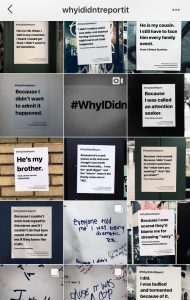The use of social media as a platform to raise awareness and promote activism is a recent phenomenon that has proven to be particularly successful in social media-driven fundraising efforts, as Rotman notes. The popularity of cell phones allows charities to harness the power of text messaging in order to encourage more donors to participate. For example, text-message donations raised $7 million dollars in just four days after the devastating Haiti earthquake in 2011 (Rotman). In these early stages of social media, the internet has “opened up a whole new world for philanthropy,” (Rotman). Social media allows access to vast amounts of people, therefore empowering social movement globally (Lovejoy & Saxton, qtd in Valenzuela).
Social networks utilize the octothorpe character (Nicks), more commonly known as a hashtag, to index relevant keywords when searching or posting about a topic. When users click on a hashtag often enough for it to gain momentum, the subject becomes a trending topic, and it surges in popularity for a limited amount of time. Hashtag activism allows for a feeling of collectivity within a group, “promoting personal and group identity construction – key antecedents of political behavior – by allowing multiple channels for interpersonal feedback, peer acceptance, and reinforcement of group norms” (Dalton, Sickle, &Weldon; Papacharissi qtd. in Valenzuela). For example, the use of #BlackLivesMatter highlights a collective feeling of discrimination against African American minorities. Not only does it raise awareness among black communities in the United States, it also draws support on a global scale. The Black Lives Matter movement reacts to oppressions felt by a minority group, and advocates for change through a social media platform. In a similar manner, supporters of Dr. Christine Ford used social media to show their solidarity against President Trump’s patriarchal comments regarding Dr. Ford’s sexual assault allegations. President Trump remarked,
“I have no doubt that, if the attack on Dr. Ford was as bad as she says, charges would have been immediately filed with local Law Enforcement Authorities by either her or her loving parents. I ask that she bring those filings forward so that we can learn date, time, and place” (Malloy).
In response, women rallied together by showing their support using #WhyIDidntReportIt and #BelieveChristine. Their fight against victim blaming was carried out in a public forum made possible by the interaction and sharing on social media.

The debate is whether or not social media activism is a true form of activism. “Does the rising use of social media to produce meaningful change echo the same success experienced by the [the International Red Cross]…?” (Rotman). Individuals who talk about public relations will likely act on their beliefs in forms of political activism (Valenzuela). Communicating political unrest allows individuals to “to grapple with ideas, elaborate arguments, and reflect on the information acquired” (Valenzuela). Conversations are essential to political change, whether they are in person or over media platforms, as this conversation at least raises awareness and knowledge, and most likely “translates into more meaningful and tangible societal benefits.” (Rotman).
Works Cited
Malloy, Allie. “Trump Unleashes on Kavanaugh Accuser.” CNN, Cable News Network, 22
Sept. 2018, http://www.cnn.com/2018/09/21/politics/donald-trump-brett-kavanaugh-accuser-tweets/index.html. Accessed 6 Nov. 2018.
Nicks, Denver. “You’ll Never Guess the Real Name for a Hashtag. Time, Time Magazine. 13 June 2014, http://time.com/2870942/hashtag-oed-oxford-english-dictionary/. Accessed 22 Nov. 2018.
Rotman, Dana. “From slacktivism to activism: participatory culture in the age of social media.” CHI ‘11 Extended Abstracts on Human Factors in Computing Systems, May 2011, pp. 819-822, https://dl.acm.org/citation.cfm?id=1979543. Accessed 6 Nov. 2018.
Valenzuela, Sebastián. “Unpacking the Use of Social Media for Protest Behavior: The Roles of Information, Opinion Expression, and Activism.” American Behavioral Scientist, vol. 57, no. 7, July 2013, pp. 920–942, doi:10.1177/0002764213479375. Accessed 6 Nov. 2018.
One thought on “Hashtags and Social Activism”